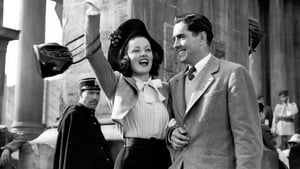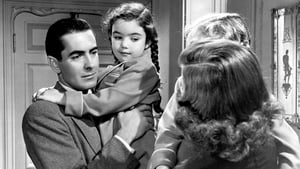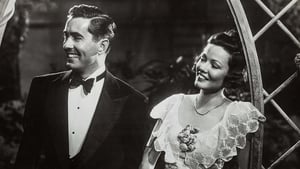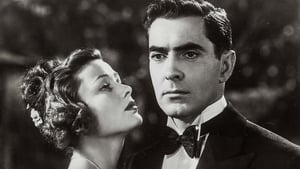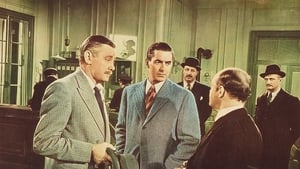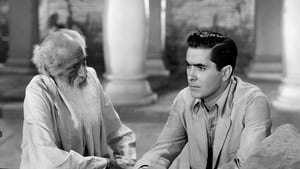Video Sources 0 Views
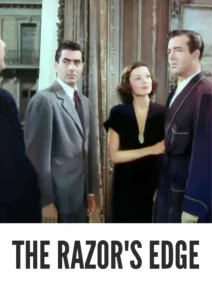
Synopsis

Embark on a profound journey of self-discovery with The Razor’s Edge, a thought-provoking drama from 1946, now beautifully colorized for a revitalized viewing experience. Starring Tyrone Power, this classic film explores themes of spirituality, disillusionment, and the search for purpose in a war-torn world. Perfect for those who appreciate films that delve into the human condition and offer a glimpse into the search for enlightenment, this HD download brings a timeless story to your screen. Based on the novel by W. Somerset Maugham, The Razor’s Edge invites viewers to contemplate the deeper meaning of life.
The Razor’s Edge tells the story of Larry Darrell (Tyrone Power), a young American pilot who is deeply affected by his experiences in World War I. Haunted by the death of a fellow airman, Larry becomes disillusioned with the materialistic values of his social circle and embarks on a quest for spiritual enlightenment.Leaving behind his fiancée, Isabel (Gene Tierney), and a promising future, Larry travels the world, seeking wisdom from various spiritual teachers and immersing himself in different cultures. His journey takes him to Paris, where he lives a simple life and studies philosophy, and later to India, where he finds a guru who guides him on the path to self-realization. Meanwhile, Isabel struggles to understand Larry’s choices and attempts to move on with her life, ultimately marrying another man. However, their paths continue to intersect, and Isabel is forced to confront her own values and desires.The Razor’s Edge is a story of love, loss, and the search for meaning in a world filled with uncertainty. It explores the tension between material comfort and spiritual fulfillment, and the challenges of finding one’s place in a rapidly changing world. The film’s title, taken from a verse in the Katha Upanishad, symbolizes the narrow and difficult path to enlightenment. Another version of this story can be found in the 1984 film with Bill Murray.
The film features a stellar cast of actors who bring these complex characters to life:
- Tyrone Power as Larry Darrell
- Gene Tierney as Isabel Bradley
- Anne Baxter as Sophie MacDonald
- Clifton Webb as Elliott Templeton
- Herbert Marshall as W. Somerset Maugham
The Razor’s Edge falls into the genre of spiritual drama, with elements of romance and philosophical exploration. Its thoughtful narrative and compelling characters make it a captivating and emotionally resonant film.
Released in 1946, The Razor’s Edge reflects the post-World War II mood of disillusionment and the growing interest in Eastern spirituality. As people struggled to make sense of the devastation and loss of the war, many turned to alternative philosophies and religions in search of meaning and solace. The film taps into this cultural zeitgeist, exploring the search for inner peace and the rejection of materialistic values. The Razor’s Edge was made during a time when Hollywood was beginning to tackle more complex and challenging themes, reflecting a shift in audience tastes and a growing awareness of global issues.
This colorized version of The Razor’s Edge has been meticulously restored, using modern digital techniques to enhance the visual appeal while preserving the film’s original atmosphere and emotional depth. The colorization process involved a careful analysis of the original black and white footage, with attention to detail in recreating the costumes, settings, and overall aesthetic of the 1940s. The result is a visually stunning and emotionally engaging viewing experience that brings new life to this classic film. While the techniques remain largely proprietary, the goal was to make the film more accessible to contemporary audiences.
- : Edmund Goulding
- : Lamar Trotti
- : the novel by W. Somerset Maugham
- : Arthur C. Miller
- : Barbara McLean
- : 20th Century Fox
- : 20th Century Fox
- : 146 minutes
- : MP4
- : HD (1080p)
- : Compatible with most devices, including smartphones, tablets, computers, and smart TVs.
The Razor’s Edge (1946) received mixed reviews upon its release, with some critics praising its philosophical depth and strong performances, while others found it overly long and pretentious. However, the film was a commercial success and won an Academy Award for Best Supporting Actress for Anne Baxter. Over the years, The Razor’s Edge has gained a reputation as a thought-provoking and visually stunning film that explores timeless themes of spirituality and self-discovery. It remains a favorite among those who appreciate films that challenge and inspire.
- : What is The Razor’s Edge about?
- A: The Razor’s Edge is a spiritual drama about a young man’s quest for enlightenment after World War I.
- : Is The Razor’s Edge (1946) a faithful adaptation of the novel?
- A: The film is based on W. Somerset Maugham’s novel of the same name, but it does take some liberties with the plot and characters.
- : Is this version of The Razor’s Edge colorized?
- A: Yes, this version has been professionally colorized to enhance the viewing experience.
- : What makes The Razor’s Edge interesting for classic film fans?
- A: The Razor’s Edge offers a glimpse into the post-war era and the growing interest in Eastern spirituality.
- : What is the download format?
- A: The download format is MP4, which is compatible with most devices.
- : What resolution is the download?
- A: The resolution is HD (1080p), providing a high-quality viewing experience.
Watch The Razor’s Edge Today!
